I just read this essay by
the other day and appreciated going down the detailed journey and seeing the constants that remained throughout. It kind of reminded me of this truck and its bumper stickers I found while I was getting my car’s safety inspection done in Alexandria a few years ago:I originally posted these photos on Imgur a few years ago, and the truck’s owner found the post and explained his own political trajectory in his own words. It’s worth a read through the comments for his story buried in there.
Anyway, my own political development has gone through some changes over the years, as well, so I thought it would be fun to summarize it all by both age range and years, peppered, as usual, with pictures throughout (taken by me unless otherwise noted):
Age 12, summer before I started junior high. I was, before then, a normal enough child, completely politically ignorant and only knew what I heard my family members randomly yelling about when the news was on. My extended family is politically diverse, so the content of the TV-yelling always varied depending on who was over or where we were.
I visited my grandma in rural Missouri for two weeks, as was customary for my sister and I every summer throughout childhood. My grandma was a very politically-minded woman (actually the mayor1 of her small town after my grandpa, the prior mayor, died in the early 90s) and often had C-SPAN playing on TV and conservative talk radio — Rush Limbaugh in particular — on the radio. One day in the kitchen, passively listening while Grandma was sitting at the table with Rush on, I asked her, “what’s the difference between a Democrat and a Republican?” She was happy to answer. I don’t recall the details of her explanation, but it boiled down to “Democrats are immoral and want the government to control your life and Republicans are morally righteous and want you to have freedom.” (President Clinton was being tried for the blow job at the time.)
And thus, Republican April was born.
I listened to Rush every day with Grandma for the rest of the two weeks there that summer and watched C-SPAN with her, learning how Congress worked. I went home with a new subscription to Limbaugh’s quarterly newsletter (thanks, grandma), and a new obsession: getting Bob Dole elected. God, I wish I had a picture of the handmade, painted wooden yard sign I’d made after my mom refused to get me a normal one. “Bob Dole for President.” She did let me in on a secret, though:
“You’re going to need to chill on the new politics obsession when you get to middle school. People are going to think you’re weird.”
My mom wasn’t opposed to Dole; in fact, if I recall correctly, she voted for him that election year. But she was, and still is, known for saying things like: “they’re all liars. I just vote for the best one.” (My inclination toward cynicism is beginning to make sense.)
I maintained my interest in politics and I’m pretty sure I even found a way to join some young Republicans club, although all I remember about it was a membership card. Being 12, though, I didn’t really have anything to do about anything, so after I read all the books Rush had written that I could find in the library (they were alarmingly easy to read at my age, which I should have realized was not necessarily a good thing), I refocused my obsessions on more normie middle school girl stuff, like astrology and YA horror novels.
High school. This is where I discovered the connection between Democrats and teachers and met more students who were actually interested in politics, usually adopting their parents’ views as I mostly had. I lived in a very liberal area and my mom voting for Republicans was somewhat unusual for someone in her demographic, but I always relished being the “different” one, always wanting to take a different side than everyone else (my contrarian inclinations are beginning to make sense).
Although I thought and acted like a liberal (I was vocally pro-gay rights and other typically left-coded issues), I still called myself a Republican if someone asked. Later, when I became involved with an evangelical Christian youth group for a year or two, it was further solidified that that was the “good side,” and I just went with it, although I no longer had any reason to think of Democrats as evil since I knew so many people who identified as such, including other Christians.
After I eased out of that particular youth group2 and became more of a normal teenager who didn’t think about sins all the time and had more conversations with people who believed other things, I learned more and my mindset started to shift.

Senior year. That November was the year 2000: the Bush v. Gore election, and I was still 17 and couldn’t vote, but our school held a mock election. I went online and took a quiz to find out which candidate aligned best with my values. It told me I was most similar to Ralph Nader. I still don’t remember who I voted for in that mock election, but I remember feeling completely undecided until the last second. I guess that was about the time when I started examining my values in relation to what I’d called myself and started to wonder if “Republican” fit anymore, or if it ever really did.
19 - 26ish. I was a very standard NPR tote bag liberal/progressive during this time, with gradually increasing political engagement, mostly online. The turning point, as I remember it, was a coworker at the photo lab where I worked. I was registered to vote as soon as I was able and was very excited to finally be able to do it, and told her that I was still undecided about the upcoming senate and gubernatorial races. She was a passionate fan of then-Senator Paul Wellstone and she started telling me about Wellstone and why she planned to vote for him. His values matched mine very well, and I was convinced. I planned to vote for him.
Of course I would not get the chance, as Senator Wellstone was tragically killed shortly after, only 11 days before the election. (Many Minnesotans still display his trademark green yard sign during election years). He was replaced in the race by Vice President Walter Mondale, who lost to Norm Coleman, who went on to later lose his bid for re-election to former Senator Al Franken in 2008 by a hair. I still remember being on the edge of my seat during that time and throughout the recount that followed, thrilled when Coleman finally conceded and Franken won. I loved Franken in the Senate until he was yeeted so unceremoniously from his seat a few years back and yeah, I’m still mad about it.
Anyway, that year, no longer able to vote for Wellstone and uncertain about everything else, I voted straight Green Party down the ticket. And here we encounter Increasingly Left-Wing April.
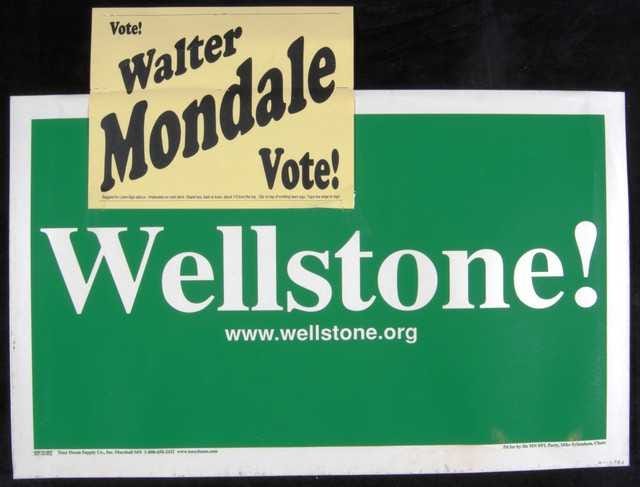
I went onto art school at 20, solidifying my place on the political left as I learned more and more from my extremely left-wing classmates who were more politically active and knowledgeable than I was at the time. Like everyone else I hung out with then, I hated Bush and our governor at the time, Tim Pawlenty, and I voted regularly for Democrats, although I maintained my independent streak and often considered third parties instead. I donated to my local NPR member station, trolled conservative talk radio hosts like it made a difference, and I voted for Obama and grinned like a maniac at the diverse morning bus population the next morning after he won. I maintained a feminist blog as I learned about patriarchy, oppression, privilege, and all the attendant critical theories. I read a lot of nonfiction and philosophy.
26 - 28ish. Obama had been president for a while, we were still in some wars with new ones threatening, the ACA hadn’t included a public option like I’d hoped, and I was beginning to become more frustrated with the flaws of our two-party system that were becoming increasingly apparent to me. For the past few years, I’d been learning about Instant-Runoff Voting (Ranked Choice Voting, etc.) and became a huge proponent, educating everyone I could about what it meant and voting for its implementation in Minneapolis where it would go on to win and be used in city elections. I had become more interested in economic issues than the identity issues I’d cut my teeth on, believing class to be a more pressing and all-encompassing issue than identity and beginning to see identity politics as a distraction, aside from basic issues on human and civil rights like same-sex marriage, abortion, and the like. I started learning more about common myths that I’d previously believed unquestioningly, like the misleading way in which the pay gap is too often presented.
Enter Democrat-Skeptical April. Ron Paul was having a moment then, and I was intrigued. I watched debate after debate and liked a lot of what I saw and heard, but I couldn’t get past his anti-abortion stance. That issue remains one on which I am unwilling to compromise (which is why — spoiler alert — the Democratic party usually gets my reluctant vote in the purple state in which I live now). I had a growing interest in state’s rights and how they might be used to the advantage of real people instead of moneyed interests, and I was also reading more about Distributism, sometimes called "the “third way” of economics. I was not thrilled with free-market capitalism, but I was skeptical of centrally-planned economies and looking for what else was out there.

I was starting to get antsy. I was seeing all these revolts popping up everywhere: the Arab Spring was happening, there were riots in the UK, and I felt revolution in the air and wanted to be a part of it. As if answering my call, I found out the Wisconsin state capitol building was being occupied by protesters over the likely elimination of collective union bargaining rights for state employees, and you better believe I got in my car, broken power steering be damned (god, that was a workout), picked up a couple friends, and made the 5-hour trip to Madison to take part in the massive event.
I came home even more antsy because it was such an invigorating experience to be a part of such a massive protest — my very first. I was eager to do more, especially in-person activism. Since I was already a writer and spent much of my time online reading and writing about the issues I was most concerned with, I was elated that that summer’s conference for liberals on the internet, Netroots Nation, was being held in Minneapolis. I bought tickets and attended.
Unlike my experience in Madison, I left Netroots Nation feeling angry rather than energized. It was a cool social experience and I met some nice people that I’m still contact with to this day (one of them just won his first City Council race in Ohio!), but it only solidified my increasing disillusionment with the Democratic Party, with most people and speakers acting like simply electing more Democrats would solve all of our problems. I met a couple Right Online folks at a bar down the street during one of the breaks during the conference and decided my next goal would be to form some kind of alliance with these folks based on the few things we could agree on. It didn’t go very far.
Once again, the answer to my need to join some kind of revolution came to me in the form of Occupy Wall Street. Just as I was trying to figure out how to get myself to New York City for an extended urban camping trip, I found out that organizers in Minnesota were already planning a satellite occupation, to ironically occur across the street from the bank where I worked as an accounting specialist. I went to the first planning meeting and worked day and night with my new friends to make it happen. I joined the Media Committee and did interviews with local TV and radio stations as well as some print, and I was quoted on CNN regarding the cold temperatures and our inability to have tents, per county rules. I subsequently also learned how much some stations edit, and often completely deceivingly manipulate, interview footage before airing it.
I stayed up all night writing press releases and asking local activist and political groups for endorsements. I lost nearly 20 pounds in two weeks because I was so stressed and full of adrenaline leading up to the first day that I couldn’t even think about food, and while I had actually wanted to lose maybe 5lbs or so before it all started, I had gotten down to 107 on my 5’4” frame and looked downright skeletal by that point, subsisting on forced-down scrambled eggs and coffee at work, then maybe a cold bowl of something the Occupy kitchen whipped up here and there across the street after I got off work, often followed with alcohol at some nearby bar after the evening’s General Assembly with a few other Occupiers. I walked miles and miles around Minneapolis each day then, burning off any calories I consumed rapidly going from work to home to meetings and everything else.

Enter Radical Anarchist April.
2011 - 2016 was the time period where I spent a lot of time yelling angrily on the internet all day long about what a piece of shit our country was and how everything that was wrong in the world was related directly to hierarchy, capitalism, and American foreign policy, the latter of which I continue to know next to nothing about, but it didn’t stop me from yelling about it. I stopped voting for Democrats, preferring instead to strategically “waste” my vote on third parties, and instead of helping to re-elect Obama that upcoming year in 2012, I decided to vote for Jill Stein. I was in Minnesota, a safely blue state, and was happy Romney didn’t win, but already over hearing, every four years, that this was “the most important election of our lives” and resented (and still do) the insistence by more partisan loyalists that the Democratic party doesn’t need to earn my vote and that simply being marginally better than Republicans was enough to deserve it.
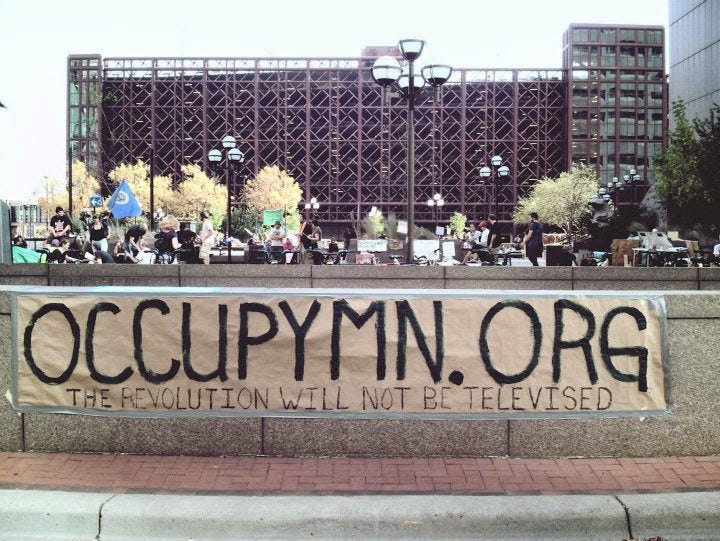
After Occupations around the country started to shut down the following year, by choice or by force, I tried to find something else to continue my thirst for revolution and change and decided to focus my efforts on workplace unionizing. I joined the Industrial Workers of the World and went to a few local meetings, ultimately not really ending up doing much with them because my job wasn’t the type to be traditionally unionized and there wasn’t much I could offer in the way of support.
I helped out making graphics and memes to promote Occupy Homes MN, an offshoot of Occupy Minneapolis that succeeded in stopping several evictions and foreclosures. I helped out with the Neighborhood Democracy Project offshoot we started in Minneapolis, taking surveys from neighbors around the city. I attended Black Lives Matter protests and even tried to help stop traffic on I-94 for a protest once, but it didn’t work logistically (I think the day for that style of protest has come and gone, personally. Pissing off regular people when they’re fighting traffic isn’t generally an effective approach for gaining their sympathy).
I continued to desire broader change, but didn’t really know how to make it happen anymore after Occupy died. The next opportunity came when Minneapolis police killed Jamar Clark and protesters had decided to occupy the police station in the precinct where Clark was killed. I visited the occupation a few times, bringing supplies and snacks they requested online and going on protest marches.
At the end of 2016, my husband and I decided to move halfway across the country from Minnesota for a job opportunity in Northern Virginia, where we now live. Trump had just been elected, of course, and we’d be arriving in a suburb of DC just before the inauguration. We immediately connected with local DC-area activists to plan a protest, but due to a series of events, did not end up attending in the end, only wandering around DC the day before in awe at the pre-inaugural display.


2017 - present. Being in a region of a Southern state being actively taken over by Yankees pursuing careers in government or defense contracting (cough), my perspective has shifted. While I maintain the same socially liberal values I’ve always maintained, a few things have changed. Namely, I’m not as anti-capitalist as I used to be. I do, however, think that the market cannot handle everything humans need and deserve (like healthcare), and because I am interested in living in an intelligent and healthy society, I appreciate the concept and expansion of adequate social safety nets and some version of healthcare reform that does not force patients to foot huge bills for necessary care, as well as education funding, among other things.
I’ve also become utterly exhausted with the way leftist activism has completely lost the plot, focusing on unpopular identity politics to the detriment of the economic reforms we desperately need and being generally obnoxious human beings interpersonally. Having been one of them in the past, I am a bit more tolerant, however, and like I mentioned in my first post about some of the differences I’ve noticed between here and Minnesota, living among so many people whose values directly contradict mine has taught me valuable lessons in tolerance.
If I were to call myself anything right now, at this stage in my political life, I suppose the best-fitting label would be… a basic, left-leaning liberal with defiant libertarian/anarchist tendencies. I went to the Supreme Court to protest Dobbs and I’ve participated in several women’s, abortion rights, and BLM marches and rallies since moving closer to the Capital. I supported Andrew Yang in 2020 because I will always geek out about the weird tech guy until they inevitably prove themselves to be annoying morons. I try to show up when and where it counts. But I’m not really much of an “activist” anymore, preferring a more… drama-free3 life.
brb, gonna go dust off the ol’ tote bag. NPR has changed over the years and I don’t donate to them anymore, but I do still appreciate what they used to be, and I still have it programed in the car radio and tell Alexa to play Radio IQ or WAMU throughout the day, regardless. And I’m glad Jon Stewart is back on The Daily Show. As the kids say, he ate that first episode back. Take that, Mary Trump.
The youth group boy I had a crush on didn’t want to go out with me and church became very boring after that.
I’ll write more about my experience organizing with our local Occupy chapter and the attendant drama another time.





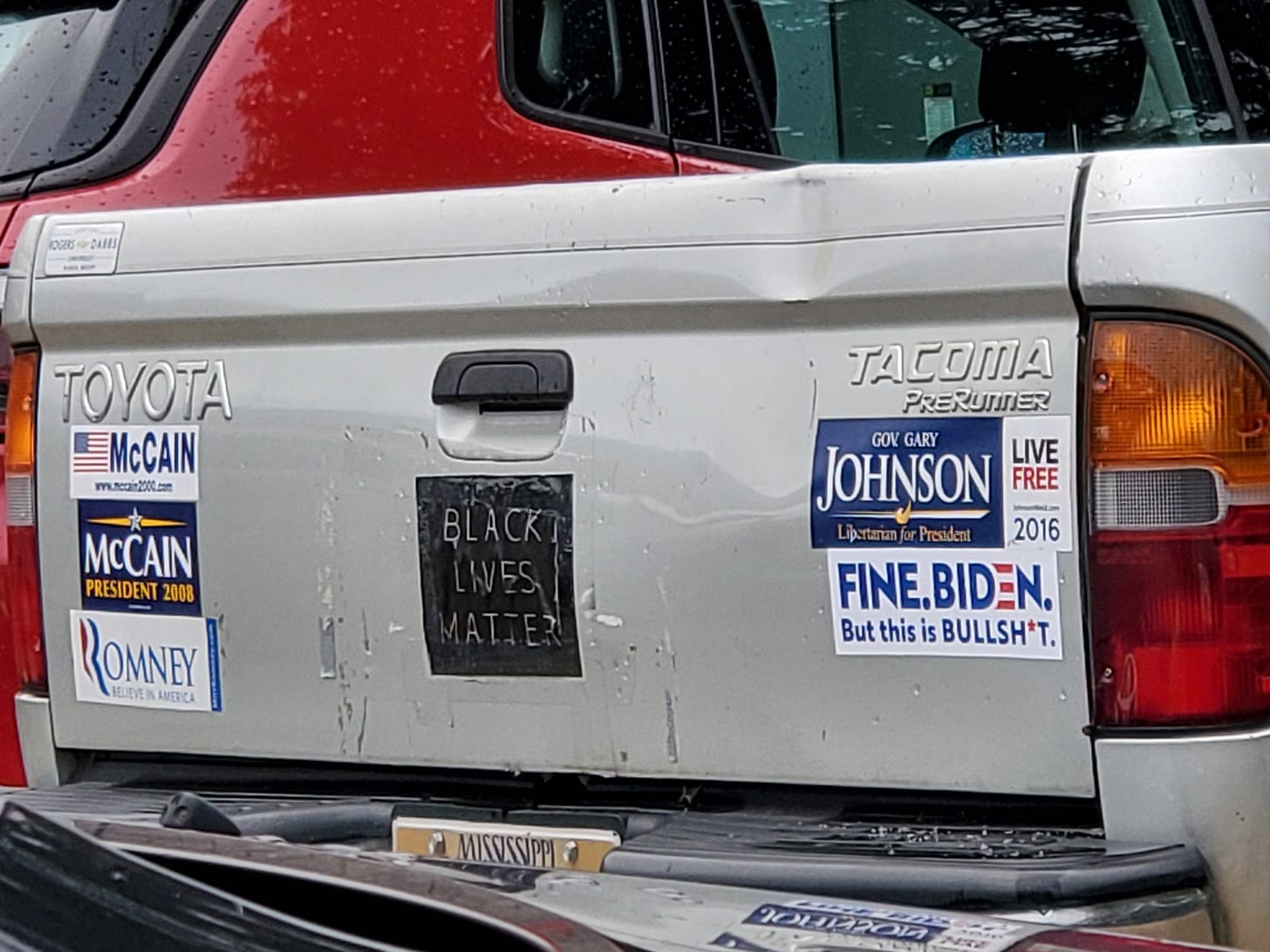

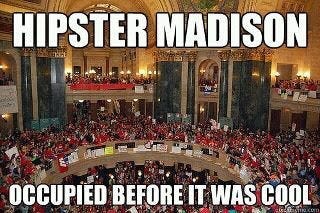
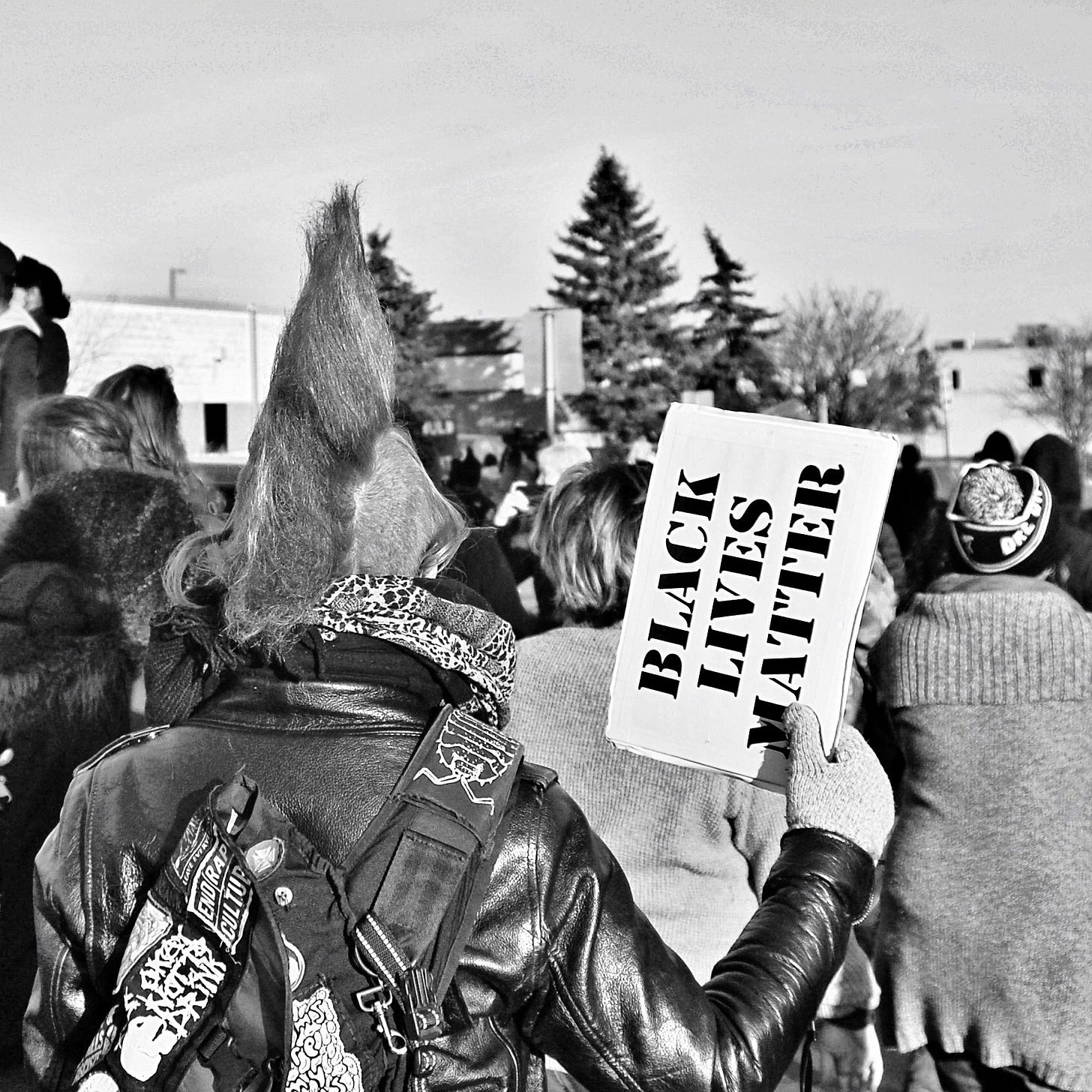
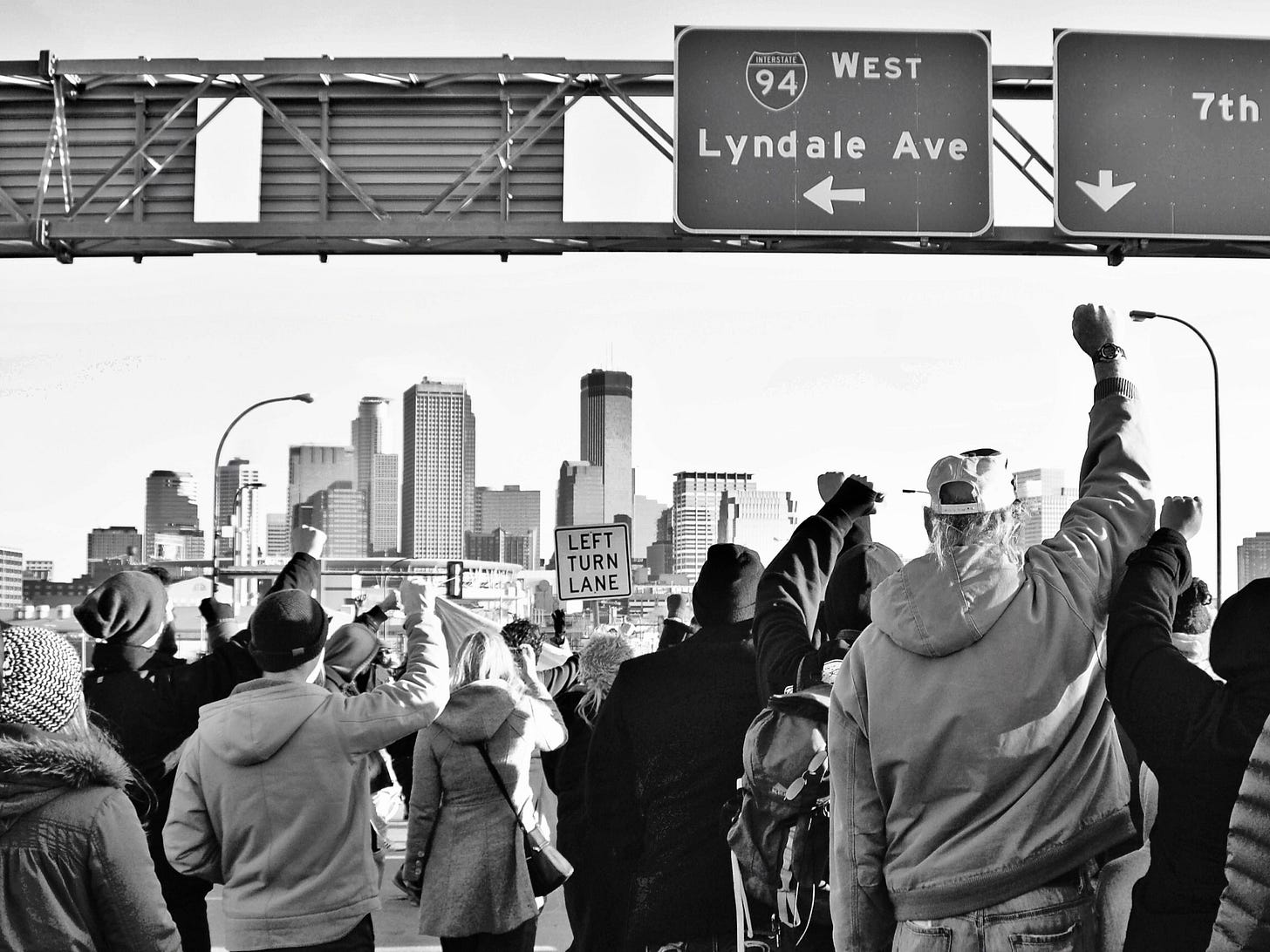
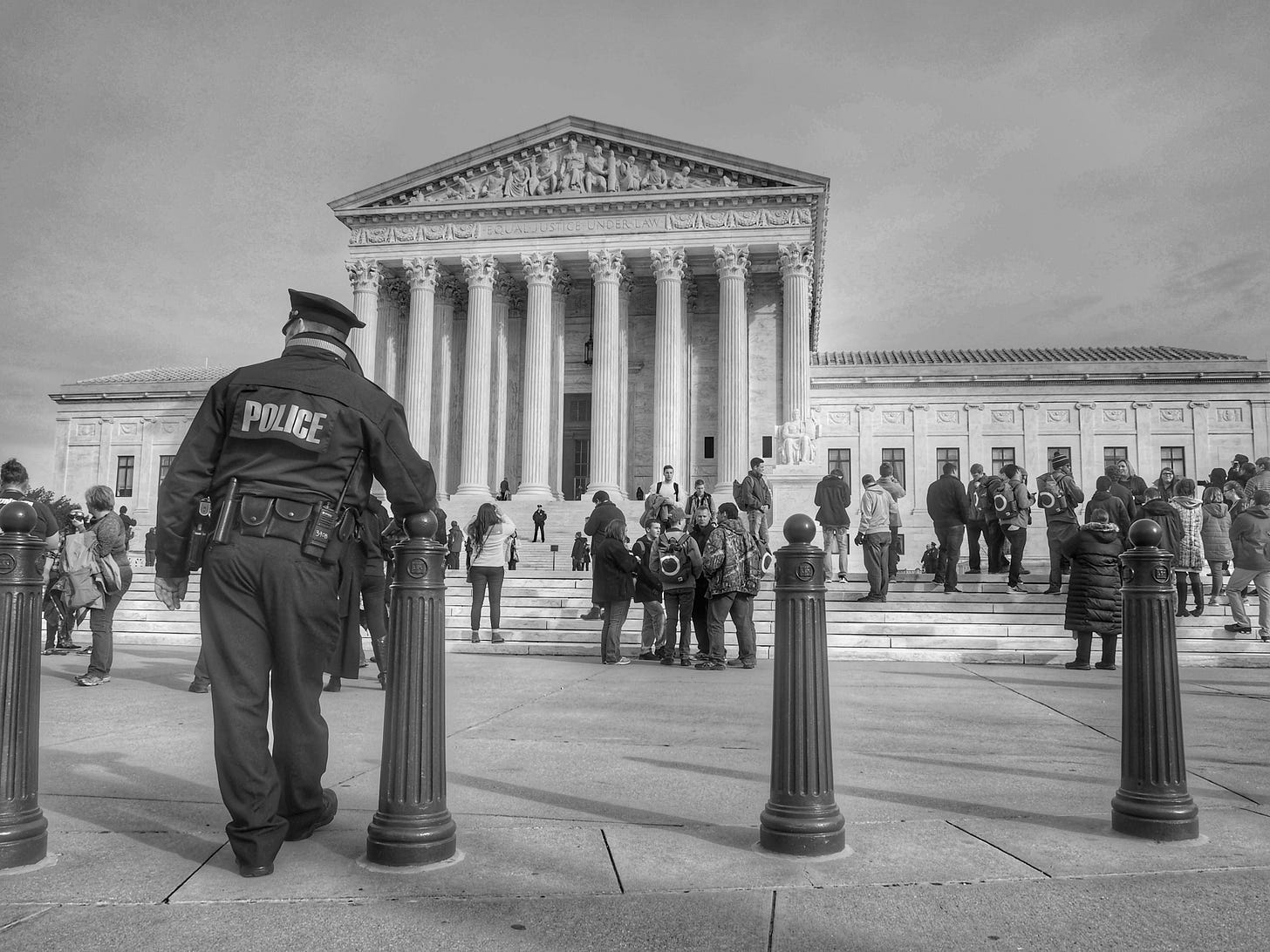

I’m deeply impressed by your courage in having strong political convictions before you had the knowledge to justify them...
Interesting piece. I look forward to reading the Occupy follow up, as I recall watching in real time that entire movement being destroyed by idpol.